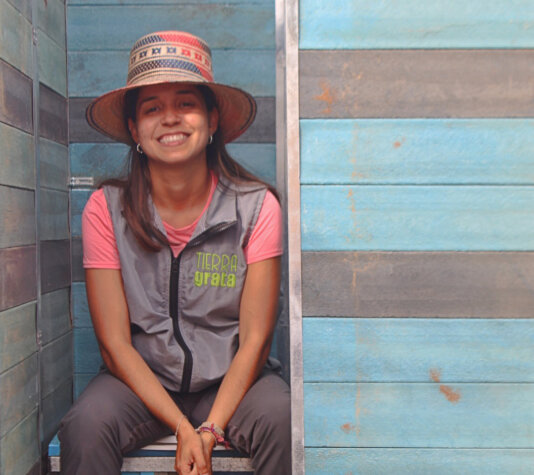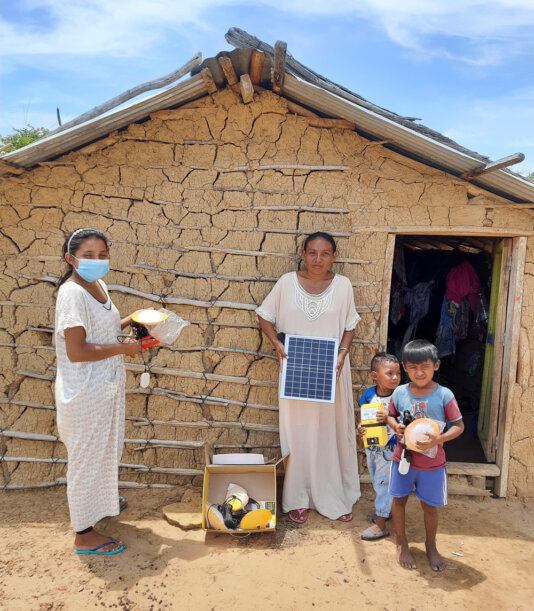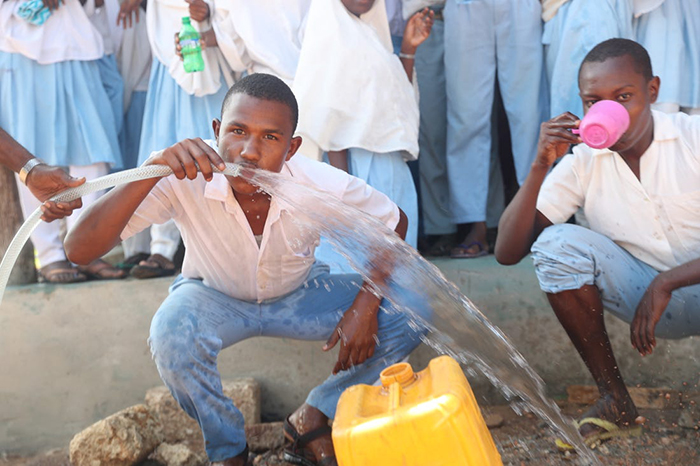- About
- Topics
- Picks
- Audio
- Story
- In-Depth
- Opinion
- News
- Donate
-
Signup for our newsletterOur Editors' Best Picks.Send
Read, Debate: Engage.
| March 28, 2022 | |
|---|---|
| topic: | Sustainable Development |
| tags: | #Colombia, #Sustainable Development, #water, #clean energy, #solar energy, #sanitation |
| located: | Colombia |
| by: | Magdalena Rojo |
Tierra Grata is a Colombian non-profit organisation providing access to clean energy, water and sanitation to rural communities across the country. It was established and is run by young Colombians who pursue sustainable and participatory development.
Since its establishment in 2016, the organisation has been able to help improve the living standards of more than 10,000 people through decentralised, environmentally-friendly solutions based on an interes-free payment system that is tailored to people’s individual income level.
FaiPlanet spoke to Tierra Grata’s CEO, Jenifer Colpas (31), about the organisation’s mission, activities and solutions.
FairPlanet: Tierra Grata’s work focuses on rural areas. Can you describe what life is like in these communities?
Jenifer Colpas: In Colombia’s rural communities people live off agriculture. They can also be fishermen or artisans. They do not commercialise a lot because access to these communities can be difficult. Places where we work have no roads, there is no healthcare, no education and no access to basic services, including water. People exchange what they produce. So, even if they are poor, the way they live is very different from urban poverty - where you find more security or drug issues. Here they help each other out a lot.
Many of the communities you work with have been affected by guerilla conflicts. Who are the people who live in these communities?
The demographics are varied. You can find farmers, people displaced by the conflict, indigenous people and afro-descended people. For example, in the north, in La Guajira region, you can find mainly indigenous people from the Wayuu ethnic group. But you can also find Wayuu from Venezuela in urban areas there.
The Montes de María region is well-known because it was a very strategic spot for guerrillas and paramilitary groups. This is where we started working seven years ago and the population here is mostly displaced people, farmers. We were only able to work there because of the peace agreements; otherwise it was very dangerous.
When you first decided to establish Tierra Grata, did you know exactly what types of services you were going to provide? Did you know you would bring solar panels, ecological toilets and water filters to rural communities? Or did you first go to the communities to see what they needed?
Our team members had already experienced working in poor urban settlements so we had some idea what such communities needed. Firstly, we wanted to provide access to energy. As we were getting to know the communities, we understood that there was no access to any basic services, not just energy. We realised that providing energy would not fulfill the expectations of the families we worked with. We could never achieve the growth of these communities with energy only.
Tierra Grata runs three main programs: you provide solar panels, water filters and ecological bathrooms. Have you established these sustainable solutions with the help of experts?
We spent more than two years perfecting the solutions together with the communities. Our experts came from within the communities: their leaders, women in the communities.
We had some ideas in the beginning and brought some prototypes to the communities and we tried to align the solutions with what they needed. We developed solutions together with them and, of course, we had partnerships with universities and innovation centers as well.
Apart from your solutions being participatory, they are also sustainable. What is the significance of sustainable development in your view?
Since the beginning, our goal was to improve the life of communities but through environmentally friendly solutions. That is why we called the organisation Tierra Grata. It is our way to give to the Earth. If I give something to the Earth, it would give me something back. It can support me in some way.
But, we know that talking about sustainable development could sometimes be done from a very privileged perspective. If you do not have anything, it is hard to choose a sustainable solution. In such cases, people just need quick access to energy, for example, they do not need it to be environmentally friendly.
By fulfilling the basic needs of people in rural communities, you are at the same time solving other challenges that they face, such as access to education, for instance, which is difficult to attain without electricity, or better healthcare. Do you evaluate how your solutions contribute to solving these other issues?
We have had certain indicators that we have been evaluating from the beginning. However, every year or so we have to adjust them to the situation since the communities keep on surprising us with how the services we provide help them.
For example, women have more free time once you introduce electricity to the community since they can make juice fruits for children using a blender. They do not have to carry out a lot of activities, and instead can entertain themselves, too. People really start dreaming instead of having a life where you just wake up to survive the next day somehow.
Some communities, for instance, asked us to provide energy for small stores that they wanted to open so that they would not have to walk far to sell their produce. They said: We have meat, we have milk, but no way to refrigerate it. They just needed a refrigerator and a solar panel to power it. This way we create new ways of livelihood.
You work a lot with women in the communities. Can you explain your reasoning behind focusing on them?
We have so-called guardians in the communities. For example, water guardians, light guardians. And these are mostly women. Besides helping us with logistics, they are our main partners in the communities. We train them in how to establish solutions, how to repair them, and they are our primary contact within the community. So if something happens, they will be the ones to provide support.
Thanks to this, women are not only people who cook - but are also leading solutions within the community.
Would you say these women are becoming empowered thanks to your programs?
They are already very powerful and super-empowered women, since they have passed through many difficult situations, such as extreme poverty. But I can say that their role is changing. They used to be strictly housekeepers and now they are the ones who install the solar panels. People start seeing their full potential.
We see all the people we work with as people with a lot of potential. We have also been changing our approach throughout the years. In the beginning, we had a more charity-oriented approach. We gave everything for free. Then we realised that giving things for free would just perpetuate things that we had seen in the field, structures that did not work any more.
If you hand people tools for free, they will not adopt them the same way. So we started charging them. We found a way in which they can pay small fees every month for solar panels, for example. In 3-4 years they will pay the full amount that the solar panel costs.
These people come from very low-income backgrounds. But for us, it was very important to see them as a part of the development.
Image by Tierra Grata


By copying the embed code below, you agree to adhere to our republishing guidelines.
